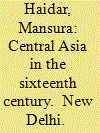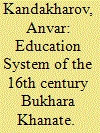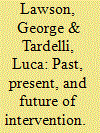| Srl | Item |
| 1 |
ID:
046617


|
|
|
|
|
| Publication |
New Delhi, Manohar Publishers, 2002.
|
| Description |
404p.hbk
|
| Standard Number |
8173044627
|
|
|
|
|
|
|
|
|
|
|
|
Copies: C:1/I:0,R:0,Q:0
Circulation
| Accession# | Call# | Current Location | Status | Policy | Location |
| 045884 | 958.102/HAI 045884 | Main | On Shelf | General | |
|
|
|
|
| 2 |
ID:
155518


|
|
|
| 3 |
ID:
139907


|
|
|
|
|
| Summary/Abstract |
This article examines the extensive intellectual and social exchange that resulted from the Ottoman imperial incorporation of Arab lands in the 16th century. In the years immediately after the 1516–17 conquest of the Mamluk Sultanate that brought Egypt, Greater Syria, and the Hijaz under Ottoman rule, Turkish-speaking Ottomans from the central lands (Rumis) found that their political power was not matched by religious and cultural prestige. As the case of Damascus shows, scholarly gatherings called majālis (sing. majlis) were key spaces where this initial asymmetry was both acutely felt and gradually overcome. As arenas for discussion among scholars on the move, literary salons facilitated the circulation of books and ideas and the establishment of a shared intellectual tradition. As occasions where stories were told and history was made, they supported the formation of a common past. In informal gatherings and in the biographical dictionaries that described them, Rumis and Arabs came together to forge an empire-wide learned culture as binding as any political or administrative ingredient of the Ottoman imperial glue.
|
|
|
|
|
|
|
|
|
|
|
|
|
|
|
|
| 4 |
ID:
124176


|
|
|
|
|
| Publication |
2013.
|
| Summary/Abstract |
Despite the prominent place of intervention in contemporary world politics, debate is limited by two weaknesses: first, an excessive presentism; and second, a focus on normative questions to the detriment of analysis of the longer-term sociological dynamics that fuel interventionary pressures. In keeping with the focus of the Special Issue on the ways in which intervention is embedded within modernity, this article examines the emergence of intervention during the nineteenth and twentieth centuries, assesses its place in the contemporary world, and considers its prospects in upcoming years. The main point of the article is simple - although intervention changes in character across time and place, it is a persistent feature of modern international relations. As such, intervention is here to stay.
|
|
|
|
|
|
|
|
|
|
|
|
|
|
|
|